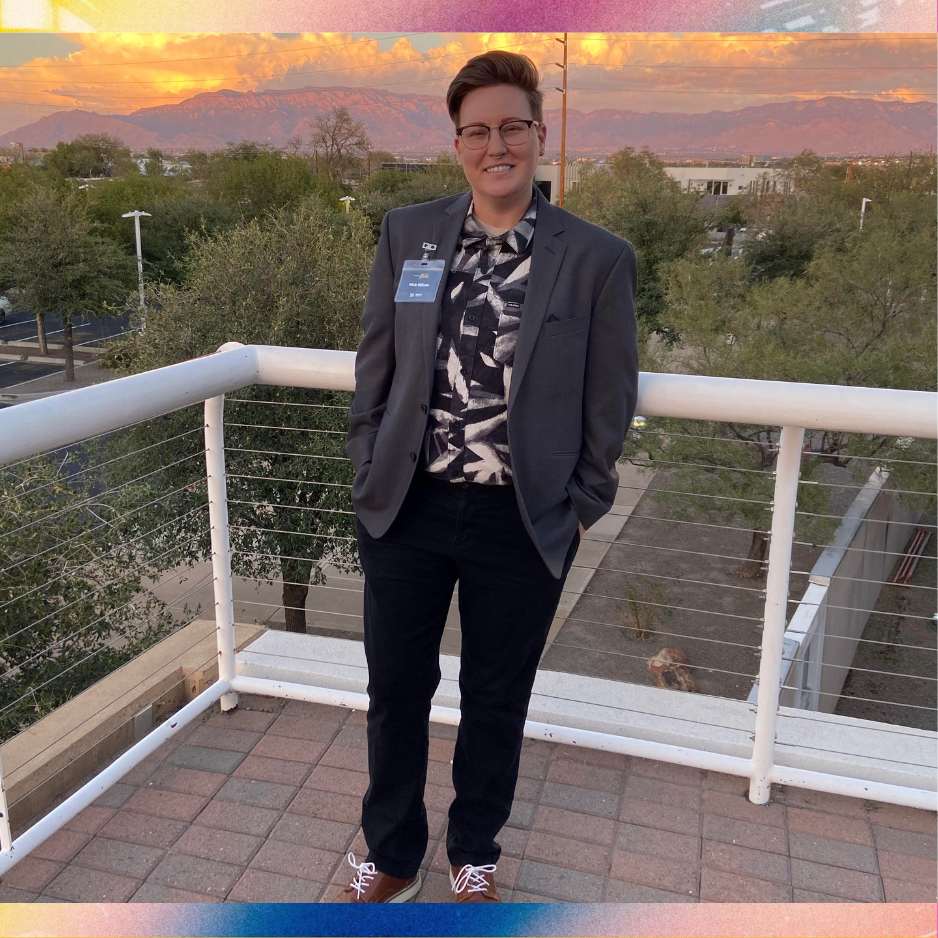This is part of a UC San Francisco series to promote greater awareness and understanding of gender identity and the use of a person’s lived name to foster acceptance, inclusion and belonging. Explore the series
How does the Gender Recognition and Lived Name Policy affect you personally? Or how do you imagine or hope it might affect you?
The policy allows people to integrate their lived name into their email address, which is highly visible to others. I changed my email address to my lived name a few years ago, before the policy went into effect, and I was lucky to have a great manager to assist with the logistics. This will make it much easier for everyone to have that kind of support.
Names hold meaning and value and are an essential part of our identity.
They are a core part of how we are introduced and how others understand us.
Prior to starting at UCSF, I had never gone by my legal name “Nicole” in day-to-day interactions – not with family, not in school, not in college and not in other workplaces. I went by Nick in everyday life, and I use both she/her and they/them pronouns.
When applying for my first role at UCSF in 2012, the only name I was able to give in the system was my legal name. The application turned into a job offer and the job offer into a full-time position, but the only name in the system was Nicole.
I quickly learned that our institution has an email structure that uses your first name-dot-last name. My email address had been set up with my legal name and there was not much to do at that time without a big hassle.
People default to calling you by the name in your email because they don’t know any better.
In my first few weeks, I was new to San Francisco and still trying to find a good place to live while trying to settle into the new role. It seemed like the path of least resistance was to start going by Nicole professionally in order to reduce the friction of everyday interaction. For years I begrudgingly went by Nicole in the workplace and it never felt right. It felt like my professional self was somehow separate from my personal self.
A few years later, I went to work at another institution and told them my name was Nick from the first interview. I was able to put that into my email signature and updated LinkedIn. Everyone called me by my lived name in the workplace and it seemed like my personal and professional self were aligned again.
A few years later, I returned to accept a new position at UCSF.
My hiring managers at the time were thoughtful enough to see that my name on my resume was Nick, so they asked me which name I would prefer for my email address. I was thrilled that it seemed things were changing for the better.
I’m thankful that UCSF is making this GRLN policy easier to access because not everyone will have hiring managers as thoughtful and intuitive that take the time to ask.

“I had never gone by my legal name “Nicole” in day-to-day interactions – not with family, not in school, not in college and not in other workplaces. ”

“I had never gone by my legal name “Nicole” in day-to-day interactions – not with family, not in school, not in college and not in other workplaces. ”
What’s one thing you would like people to know or understand about you and your experience?
Lived names aren’t just common for those in the LGBTQ+ community and that’s one of the great things about policies that are aiming to improve inclusivity.
Everyone can benefit.
Respecting and integrating people’s lived names will have wider impact than just to the queer and trans community because people from any background can have a lived name that differs from their legal name. It’s incredibly common in everyday life.
Knowing and using people’s names is a way we connect with others, and by using someone’s lived name it’s a way to both show respect and connect more authentically.
I actually don’t hate the name Nicole.
I like it just fine for filling out official paperwork and I don’t feel any need to legally change it. At the same time, I would much prefer to be known as Nick on campus. It’s not just a “Nick” name (the pun is obvious but it had to be made at some time).
It’s my professional name too.
Cultivating a UCSF culture of belonging where we all can thrive.
Join the conversation at UCSF.
Gender Recognition and Lived Name Policy
UCSF is implementing the UC Presidential Policy on Gender Recognition and Lived Name to ensure that all employees, learners, patients and affiliates are identified by their accurate gender identity and lived name.
Change Your Name and DATA
Faculty, staff, learners, affiliates and alumni should have the opportunity to identify by their accurate gender identity and lived name. Learn how to change or update your name, gender marker and sexual orientation and take training.
BE AN ALLY AND ADVOCATE
The UCSF Lesbian, Gay, Bisexual and Transgender Resource Center has several programming initiatives that promote the inclusivity of our identities, including Pronouns Matter and UCSF Pride Pin Pledge.
